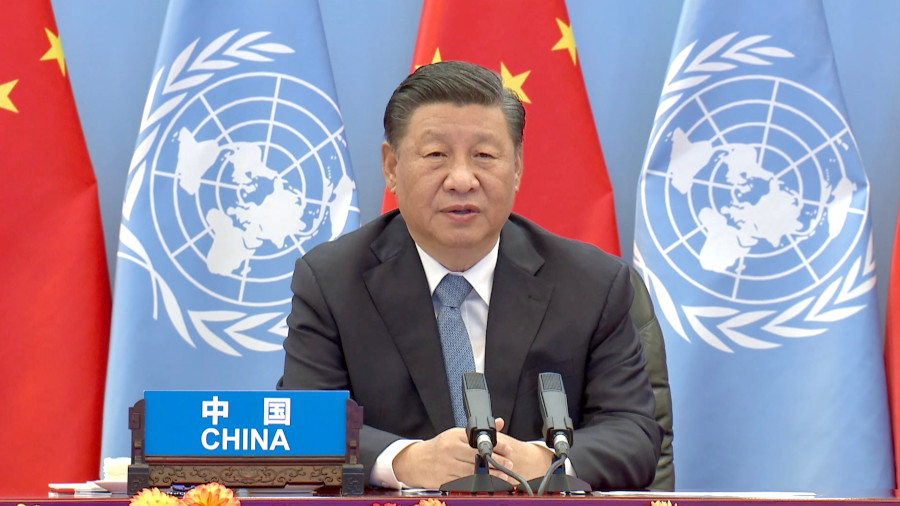China’s Position At The UN Sustainable Transport Conference
China has called for connectivity of infrastructure, unfettered flows of trade and investment, and interactions between civilisations. We examine the implications.
By Chris Devonshire-Ellis
The second United Nations Sustainable Transport Conference has been held in Beijing the past few days, concluding on Saturday (October 16), with Chinese President Xi Jinping giving a keynote speech. The event has been held to provide an opportunity to focus attention on the opportunities, challenges, and solutions towards achieving sustainable transport worldwide, and follows up on the first Global Sustainable Transport Conference, held in 2016 in Ashgabat, Turkmenistan. It is expected to indicate a way forward for sustainable transport to help achieve the objectives of the 2030 Agenda for Sustainable Development and the Paris Agreement on climate change in the Decade of Action and is an important precursor to the COP26 event being held in Glasgow next month. In this article we provide background and suitable links to important documentation in addition to an overview of the Chinese position.
What Is Sustainable Transport And Why Is It Important?

Concept
A farmer carrying produce to the local market, a ship being loaded with medical supplies, a child seated on a school bus – the movement of people and goods from point A to point B, whether going from a village to a town or across a continent or ocean, shapes sustainable development.
Sustainable transport promotes objectives of universal access, enhanced safety, reduced environmental and climate impact, improved resilience, and greater efficiency.
History
The role of transport in sustainable development was first recognized at the 1992 United Nation’s Earth Summit and reinforced in its outcome document – Agenda 21. In undertaking the five-year review of the implementation of Agenda 21 during its nineteenth Special Session in 1997, the UN General Assembly noted that, over the next twenty years, transportation would be expected to be the major driving force behind a growing world demand for energy (it is now the largest end-use of energy in developed countries and the fastest growing one in most developing countries). At the 2002 World Summit on Sustainable Development, the role of transport was once again captured in the outcome document – the Johannesburg Plan of Implementation (JPOI). JPOI provided multiple anchor points for sustainable transport, in the context of infrastructure, public transport systems, goods delivery networks, affordability, efficiency and convenience of transportation, as well as improving urban air quality and health, and reduce greenhouse gas emissions.
Development Benefits
Global attention to transport has continued in recent years. World leaders recognized at the 2012 United Nations Conference on Sustainable Development (Rio +20) that transportation and mobility are central to sustainable development. Sustainable transportation can enhance economic growth and improve accessibility. Sustainable transport achieves better integration of the economy while respecting the environment. improving social equity, health, resilience of cities, urban-rural linkages, and productivity of rural areas
Subsequently, the UN Secretary-General, as part of his Five-Year Action Agenda, identified transport as a major component of sustainable development. To this end, the Secretary General established and launched in August 2014 a High-Level Advisory Group on Sustainable Transport (HLAG-ST), representing all modes of transport including road, rail, aviation, marine, ferry, and urban public transport providers. The policy recommendations of the Advisory Group were submitted to the Secretary-General in a global sustainable transport outlook report, entitled “Mobilizing Sustainable Transport for Development”, released at the first Global Sustainable Transport Conference in November 2016.
The importance of sustainable transport for countries in special situations is also recognized by the international community, through the Istanbul Programme of Action for the LDCs, the Vienna Programme of Action for the LLDCs, the SAMOA Pathway for SIDS, the Sendai Framework for Disaster Risk Reduction, and the New Urban Agenda.
Environment
In the 2030 Agenda for Sustainable Development, sustainable transport is mainstreamed across several SDGs and targets, especially those related to food security, health, energy, economic growth, infrastructure, and cities and human settlements. The importance of transport for climate action is further recognized under the UNFCCC – the transport sector will be playing a particularly important role in the achievement of the Paris Agreement, given the fact close to a quarter of energy-related global greenhouse gas emissions come from transport and that these emissions are projected to grow substantially in the years to come.
Interagency Report

An interagency report on sustainable transport was prepared as a background document for the Beijing Global Sustainable Transport Conference, which finished on Saturday (16 October 2021). The report was prepared by the Conference Secretariat, the United Nations Department of Economic and Social Affairs (DESA), in close collaboration with other UN agencies, including the International Civil Aviation Organization (ICAO), the International Labour Organization (ILO), the International Maritime Organization (IMO), the United Nations Conference on Trade and Development (UNCTAD), the United Nations Development Programme (UNDP), the United Nations Economic Commission for Europe (UNECE), the United Nations Environment Programme (UNEP), United Nations Economic and Social Commission for Asia and the Pacific (UNESCAP), the United Nations Economic and Social Commission for Western Asia (UNESCWA), the United Nations Human Settlements Programme (UN-Habitat), the United Nations Industrial Development Organization (UNIDO), the United Nations Office of the High Representative for the Least Developed Countries, Landlocked Developing Countries and Small Island Developing States (UN-OHRLLS), the World Tourism Organization (UNWTO), the World Health Organization (WHO), and the World Bank. This report may be downloaded here.
China’s Position
China has been consistent with the messages it has been delivering concerning ‘sustainability’ in many areas over the years, ranging from the national economic development era since the days of Jiang Zemin. It has been a mantra for the Communist Party for over 30 years now – ‘sustainability’ can be regarded as a key aspect of every Chinese policy since. More recently we have seen this cross over into Chinese statements about the environment and global development. We discussed Foreign Minister Wang Yi’s speech at the recent UN Sustainable Development Forum here and his comments at the Belt & Road Forum for International Cooperation here both hammered home the ‘sustainability’ point. His boss, Xi Jinping has also been consistent concerning the issue; speeches made at the most recent Boao Forum and 2021 UN Summit in New York also stressed the point. Even Prince Charles’s recent comments to Chinese business leaders at the Sustainable Markets Initiative underlined its importance. The Chinese message right across the board has been about action – but sustainable, well planned action over the longer term. Xi Jinping’s speech at the Global Sustainable Transport Conference gave much of the same.
Xi Jinping Speech

“It gives me great pleasure to attend the second United Nations Global Sustainable Transport Conference and discuss what is important for global transport and development. Let me begin by extending, on behalf of the Chinese government and the Chinese people and also in my own name, warm congratulations on the convening of the Conference and a hearty welcome to our distinguished guests.
Transport is the artery of the economy and a bond between civilizations. A review of history shows that transport, in the forms of camel caravans and sailing boats on the ancient Silk Road, wave-breaking vessels in the Age of Exploration, and criss-cross transport networks in this modern age, has facilitated economic integration and people-to-people exchanges and turned the world into a close-knit global village.
As we speak, major changes unseen in a century, compounded by a once-in-a-century pandemic, are posing serious challenges to the global efforts of growing the economy and bettering people’s lives. It is imperative that we follow the prevailing trend of world development, advance global transport cooperation, and write a new chapter featuring connectivity of infrastructure, unfettered flows of trade and investment, and interactions between civilizations.
First, we need to uphold open interplay and enhance connectivity. A big river is full when its tributaries are filled with water; and tributaries must be dry when there is no water in the big river. Only with openness, inclusiveness and connectivity can countries reinforce each other’s efforts and achieve win-win results. It is important that we pursue an open world economy, reject discriminatory or exclusive rules and systems, and make economic globalization more open, inclusive, balanced, and beneficial for all. We should strengthen both hard connectivity of infrastructure and soft connectivity of institutions and rules, and develop four-dimensional connectivity of land, sea, air and the Internet.
Second, we need to uphold common development and promote fairness and inclusiveness. Only when countries develop together can there be true development; only when countries prosper together can there be true prosperity. The COVID-19 pandemic has aggravated the wealth gap and widened the North-South divide. Uneven development must be addressed before broader prospects for humanity’s common development could be brought about. We should leverage the enabling role of transport and increase related input in poor regions, so that local economies and people’s lives could improve as a result of better roads. We should enhance North-South and South-South cooperation and scale up support for developing transport infrastructure in the least developed countries and landlocked developing countries, in an effort to achieve common prosperity.
Third, we need to uphold an innovation-driven approach and create more drivers for development. Our world is going through a new round of scientific and technological revolution and industrial transformation. Digital economy, artificial intelligence and other new technologies and new business forms have become strong technological underpinnings for economic and social development. More should be done to develop smart transport and smart logistics and promote deep integration of new technologies like big data, the Internet, artificial intelligence and blockchain with the transport sector, to ensure easier movement of people and smoother flow of goods.
Fourth, we need to uphold ecological conservation as a priority and pursue green and low-carbon development. The only durable way to achieve sustainable development is to establish an economic system for green and low-carbon development and promote green transition in all respects of economic and social development. More efforts are needed to foster a green and low-carbon way of transport, step up green infrastructural development, promote new energy, smart, digital and light-weight transport equipment, and encourage and advocate green travel, to make transport and travel more environment-friendly and low-carbon.
Fifth, we need to uphold multilateralism and improve global governance. We live in a world where the future and destiny of countries are closely linked and their interests entwined like never before. We need to follow the vision of global governance featuring extensive consultation, joint contribution and shared benefits, pool the wisdom and strength of all, and mobilize resources from across the globe to meet global challenges and promote global development. We should uphold the authority and status of the United Nations and, in the context of implementing the 2030 Agenda for Sustainable Development, advance cooperation in such areas as poverty reduction, health, transport and logistics, and infrastructural development.
Not long ago, I proposed a Global Development Initiative, which is designed to speed up the implementation of the 2030 Agenda for Sustainable Development, promote more robust, greener and more balanced global development, and build a global community of development with a shared future. I hope more will join the Initiative.
Since the founding of New China, generation after generation of the Chinese people have worked in the spirit of opening roads through mountains and putting bridges over rivers, and turned China into a country with vast transport infrastructure. Today, we are redoubling our efforts to build a country with great transport strength. Convinced that transport should come first, we have built the world’s largest high-speed railway network, expressway network and world-class port clusters. We have opened air and sea routes that reach all parts of the world. We have set up an integrated transport network exceeding six million kilometers. Convinced of the need for innovation, we have achieved major breakthroughs in equipment manufacturing like high-speed trains and large aircraft. We have more than half of the world’s new energy vehicles. Mega transport projects like the Hong Kong-Zhuhai-Macao Bridge and Beijing Daxing International Airport have been completed and put into operation. Transport has become a frontier in China’s modernization drive. Convinced of the importance of global connectivity, we have become the economy best connected to the global shipping network and with the highest volume of trade in goods. During the COVID-19 pandemic, the China-Europe Railway Express and ocean-going cargo vessels have been running day and night to keep global industrial and supply chains stable, showcasing China’s sense of responsibility in the global community.
China will continue to hold high the banner of true multilateralism, and stay connected with the world and abreast with the times. This way, we will contribute more to global development while pursuing our own development.
I wish to reiterate that China will not change course in its pursuit of a new system of open economy of higher standards, and China will not waver in its resolve to promote trade and investment liberalization and facilitation. China’s door of opening-up will only open wider, and will never be closed.
China will continue to advance high-quality Belt and Road cooperation, strengthen infrastructure connectivity with other countries, and develop a green Silk Road and a digital Silk Road at a faster pace. Here I announce that China will set up a Global Innovation and Knowledge Center for Sustainable Transport, as a contribution to global transport development.
Let us stick together on the promising path of connectivity and mutual benefit, jointly build an open, inclusive, clean and beautiful world that enjoys lasting peace, universal security and common prosperity, and promote the building of a community with a shared future for mankind.”
Implications

China has effectively called for “the writing a new chapter featuring connectivity of infrastructure, unfettered flows of trade and investment, and interactions between civilisations.” As our good friend Stephen Perry of the 48 Group points out, “This is not just Europeans going winter skiing in the Chinese mountains on high-speed trains, it is a revolution of transportation above national borders where infrastructures are built to much longer away destinations. If you look at a map of the populations of the world. They show concentration in the USA, Europe, China, and India. With this transportation policy the world will spread out and economic development will spread across the continents. Trade and investment will not be stymied by borders and passport and custom checks.”
The upcoming COP26 emphasizes the environmental aspect of ‘sustainability’ and will go ahead even if senior leaders do not attend in person, an issue I have discussed in this week’s editorial here.
The ”transport sustainability” discussed at the UN Sustainable Transport Conference touches on many aspects of new tech and eco-friendly developments – from the use of blockchain and digital technologies doing away with customs and even physical passports, to new fuel technologies – today diesel and coal, tomorrow electric, and later gas, solar and even nuclear powered as new generations of engine technologies expand the boundaries of how and what energies can be harnessed. These are exciting times, and the Chinese position appears to make solid sense. The difficulty will be in solving political issues between capitalism and communism; the former has yet to mature into a more modern version capable of alternative viewpoints to pure profit, while communism arguably has transited through to become a managed socialism. There is plenty of food for thought as we sit on the cusp of an old world and the emergence of a digitally intelligent new one.
Related Reading
About Us
Silk Road Briefing is written by Dezan Shira & Associates. The firm has 28 offices throughout Asia, and assists foreign investors into the region. For strategic advisory and business intelligence issues please contact the firm at silkroad@dezshira.com or visit www.dezshira.com

 Corporate Sustainability in China
Corporate Sustainability in China




